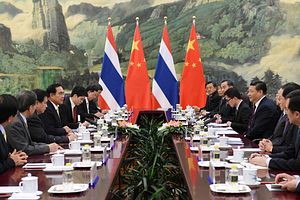Last week, China and Thailand signed a new shipbuilding pact. The agreement put the focus on ongoing efforts by the two countries to further boost the defense aspect of their wider bilateral relationship despite the issues they continue to face in doing so.
As I have observed previously in these pages, while China-Thailand defense cooperation is not new, it noticeably deepened following the coup in Thailand in May 2014 that bought a military junta to power and an initial downturn in U.S.-Thai relations that has since been recalibrated. While much of the focus has been on individual deals such as Thailand’s purchase of Chinese submarines, there have been other developments in defense ties that deserve mention as well that have either taken place or are in the works, be it new joint air force exercises or discussions about a joint military production facility.
Last week, the defense aspect of China-Thailand relations was in the headlines with the reported inking of a new agreement. The Royal Thai Navy (RTN) signed a contract for the construction of a landing platform dock (LPD) in a ceremony attended by relevant state and defense officials.
Per Chinamil, the China Shipbuilding Industry Corporation (CSIC) and the RTN held a signing ceremony for the signing of a shipbuilding agreement on the export of a Type 071E LPD in Beijing on September 9. Separately, IHS Jane’s cited anonymous sources in Bangkok as confirming the deal, with reported funding of 4 billion Thai baht ($130 million) provided through the 2020 defense budget which was announced earlier this month.
Few additional details were provided on the deal itself, including the exact cost and contractual terms and timelines. But Chinamil unsurprisingly played up the significance of the move, noting that this was the first time that China had exported the export version of the Type 071E LPD – a product of its advanced technology; maturity of use; and cost competitive – and that it marked “a major achievement” for China and Thailand within their comprehensive strategic partnership that was signed in 2015.
To be sure, the deal should be understood as just the latest in a series of steps that China and Thailand have taken in their defense ties, and it is far from being among the more consequential relative to some of the other inroads that have been made. Nonetheless, as we see more of these developments in the months and years to follow, it will be important to assess them both on their own terms as well as in terms of what they mean for wider security ties.
































